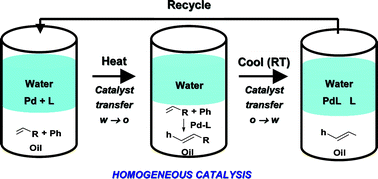Thermoregulated aqueous biphasic catalysis of Heck reactions using an amphiphilic dipyridyl-based ligand
Abstract
A neat water-based thermoregulated system for Pd-catalyzed Heck reactions is described. It uses a thermo-responsive

* Corresponding authors
a
Institut Lavoisier UMR-CNRS 8180, Université de Versailles-Saint-Quentin-en-Yvelines, 45 Avenue des Etats-Unis, Versailles Cedex, France
E-mail:
Larpent@chimie.uvsq.fr
Fax: +33 139254452
Tel: +33 139254413
A neat water-based thermoregulated system for Pd-catalyzed Heck reactions is described. It uses a thermo-responsive

 Please wait while we load your content...
Something went wrong. Try again?
Please wait while we load your content...
Something went wrong. Try again?
H. Azoui, K. Baczko, S. Cassel and C. Larpent, Green Chem., 2008, 10, 1197 DOI: 10.1039/B804828B
To request permission to reproduce material from this article, please go to the Copyright Clearance Center request page.
If you are an author contributing to an RSC publication, you do not need to request permission provided correct acknowledgement is given.
If you are the author of this article, you do not need to request permission to reproduce figures and diagrams provided correct acknowledgement is given. If you want to reproduce the whole article in a third-party publication (excluding your thesis/dissertation for which permission is not required) please go to the Copyright Clearance Center request page.
Read more about how to correctly acknowledge RSC content.
 Fetching data from CrossRef.
Fetching data from CrossRef.
This may take some time to load.
Loading related content
